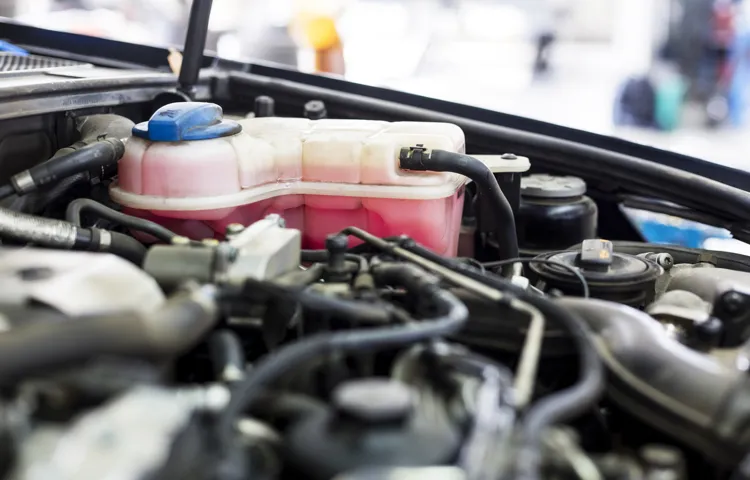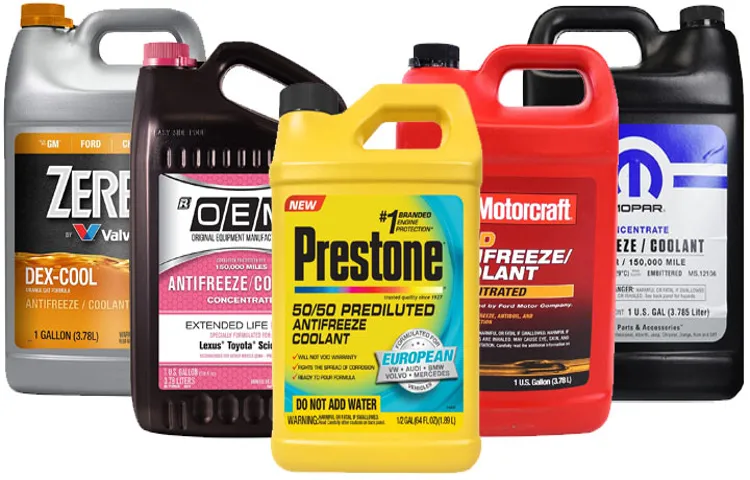Hey there! Have you ever wondered what that colorful liquid flowing through your car’s engine is? Well, my friend, that’s coolant! It’s a crucial component of your vehicle’s cooling system, and without it, your engine would overheat faster than a hot potato in a microwave.Picture this: your car’s engine is like a boiling kettle, constantly generating intense heat as it powers your vehicle. Now, if that heat isn’t properly regulated, things can get pretty steamy, and not in a good way.
That’s where coolant comes to the rescue, acting as the engine’s very own firefighter.Coolant, also known as antifreeze, is a specialized fluid that absorbs the engine’s excess heat and disperses it through the radiator. It’s like the secret sauce that keeps everything running smoothly under the hood.
Without coolant, the engine’s temperature could skyrocket, leading to potential damage or even a complete breakdown.But what exactly is coolant made of? Well, it’s a clever mixture of water and chemicals, carefully formulated to withstand extreme temperatures and prevent freezing or boiling. Think of it as a superhero blend, capable of withstanding the scorching heat of summer and the icy grip of winter.
Now, you might be wondering how often you should check or change your coolant. Just like any other liquid, coolant can deteriorate over time, losing its magical powers. It’s crucial to keep an eye on its levels and make sure it’s clean and clear, without any contaminants or particles floating around.
So there you have it – the lowdown on coolant in a car. It’s that colorful liquid that prevents your engine from turning into a fiery inferno. Next time you pop open your hood, take a moment to appreciate the silent hero keeping your car cool and your engine happy.
What is coolant?
What is coolant? Coolant is a liquid that helps regulate the temperature of your car’s engine and prevents it from overheating. It is often referred to as antifreeze because it also protects the engine from freezing in cold temperatures. Coolant circulates through the engine, absorbing heat and then moving it to the radiator, where it can be cooled down before being sent back into the engine.
Without coolant, your engine would quickly overheat, leading to potential damage or even a breakdown. So, next time you see that colorful liquid under your car’s hood, remember that it’s not just there for show – it plays a crucial role in keeping your engine running smoothly.
Definition and composition
coolantDefinition and compositionCoolant is a substance that is used in various industries to remove heat from machinery or equipment. It is commonly used in engines, refrigeration systems, and electronic devices to prevent overheating and maintain optimal working temperatures. Coolants are typically composed of a mixture of water and chemicals, such as ethylene glycol or propylene glycol, to enhance their heat transfer capabilities.
They also include additives to prevent corrosion and inhibit the growth of microbes that can clog the system. Additionally, coolants may contain dyes to help identify leaks or enhance the visual appeal of the equipment.In automotive applications, coolant is essential for maintaining the engine’s temperature within a safe range.
It circulates through the engine, absorbing heat generated during combustion, and carries it away to the radiator, where it is cooled before being recirculated. This prevents the engine from overheating and helps optimize its performance and efficiency.In refrigeration systems, coolant plays a crucial role in absorbing heat from the environment and transferring it to a different location, typically the outdoors.
This process allows the refrigeration system to cool the air or fluids within it, enabling the efficient operation of refrigerators, air conditioners, and other cooling devices.Electronic devices, such as computers and smartphones, also rely on coolants to dissipate heat generated by their components. Without proper cooling, these devices can experience thermal throttling, reduced performance, and even damage.
Coolants help regulate the temperature and ensure the longevity and reliability of electronic devices.In conclusion, coolant is a substance used to remove heat from machinery and equipment, preventing overheating and maintaining optimal working temperatures. It is composed of a mixture of water, chemicals, additives, and sometimes dyes, depending on the application.
Coolant is essential in industries such as automotive, refrigeration, and electronics to ensure efficient operation and prevent damage.

Importance of coolant in a car
coolant, importance of coolant in a car
Types of coolant
When it comes to keeping your car running smoothly, coolant plays a crucial role. But what exactly is coolant? Well, coolant, also known as antifreeze, is a liquid that circulates through the engine to regulate its temperature. It acts as a heat transfer medium, absorbing excess heat generated by the engine and releasing it through the radiator.
But not all coolants are created equal. There are different types of coolants available, and each has its own specific properties and purposes. The most common types of coolants are ethylene glycol (EG) and propylene glycol (PG).
EG coolants are more commonly used and offer better heat transfer properties, while PG coolants are more environmentally friendly and less toxic. It’s important to choose the right type of coolant for your car to ensure optimal performance and longevity. Regular maintenance of your coolant system, including flushing and replacing the coolant regularly, is also essential to keep your engine running smoothly and prevent overheating.
So, the next time you think about your car’s coolant, remember that it’s not just a simple liquid, but rather a vital component in keeping your engine cool and functioning properly.
Ethylene glycol-based coolant
“ethylene glycol-based coolant”Coolant is an essential component for maintaining the optimal temperature of our vehicles’ engines. One common type of coolant is ethylene glycol-based coolant. This type of coolant is a popular choice because it has excellent heat transfer properties, allowing it to effectively cool down the engine.
Ethylene glycol-based coolant also has a high boiling point, which means that it can withstand high temperatures without evaporating too quickly. Additionally, this coolant has good corrosion protection properties, helping to prevent rust and corrosion from damaging the engine. It is important to note that ethylene glycol-based coolant should be mixed with water in the recommended ratio before being used.
This combination not only enhances its cooling capabilities but also helps to prevent freezing in cold temperatures. Overall, ethylene glycol-based coolant is a reliable and efficient choice for keeping our engines cool and protected.
Propylene glycol-based coolant
propylene glycol-based coolant, types of coolant
Other types of coolants
coolants, types of coolant, other types of coolants, different types of coolants.
How does coolant work?
Have you ever wondered what that colorful liquid is under the hood of your car? That’s coolant, and it plays a vital role in keeping your engine running smoothly. Coolant, also known as antifreeze, is a liquid that is specially formulated to regulate the temperature of your engine. It’s made up of a mixture of water and ethylene glycol or propylene glycol, which have excellent heat-transfer properties.
So how does coolant work? Well, when your engine’s temperature rises, the coolant absorbs the excess heat and carries it away from the engine. It then circulates through the radiator, where the air cools it down. Once cooled, the coolant returns to the engine and the process repeats.
This continuous cycle of absorbing and dissipating heat helps to prevent your engine from overheating, which can cause damage and ultimately lead to costly repairs. In addition to regulating temperature, coolant also contains additives that help protect against corrosion and scale buildup in your engine’s cooling system.Not only does coolant keep your engine cool, but it also plays a crucial role during the colder months.
As the name suggests, antifreeze prevents the coolant from freezing in cold temperatures. This is important because frozen coolant can expand and potentially crack your engine block, causing serious damage. So, by using a mixture of water and ethylene or propylene glycol, coolant is able to lower the freezing point of the liquid and prevent it from solidifying when the temperature drops.
In conclusion, coolant is a vital component of your car’s cooling system. It helps to regulate the temperature of your engine, preventing it from overheating, and also protects against freezing in colder temperatures. So, next time you open the hood of your car and see that colorful liquid, you’ll know just how important it is for keeping your engine running smoothly.
Coolant’s role in preventing overheating
coolant, overheating, preventing overheating
Coolant’s role in preventing freezing
coolant, preventing freezing, role of coolant, how coolant works, freezing point depression
How to check and refill coolant
“What is the coolant in a car?” The coolant in a car, also known as antifreeze, is a vital component of the cooling system. It is a specially formulated liquid that helps regulate the temperature of the engine and prevent it from overheating. Coolant is usually a mixture of water and ethylene glycol or propylene glycol, along with additives to enhance its performance.
Its primary job is to absorb heat from the engine and dissipate it through the radiator. This prevents the engine from getting too hot, which can lead to serious damage. Coolant also serves to prevent freezing in cold temperatures, hence the name antifreeze.
It has a lower freezing point than water, protecting the engine and cooling system from freezing up during winter months. Overall, coolant plays a crucial role in maintaining the optimal temperature of the engine and ensuring its smooth operation.
Step-by-step guide to checking coolant levels
coolant levels, check coolant, refill coolant
Step-by-step guide to refilling coolant
refilling coolant
Conclusion
So, to sum it all up, the coolant in a car is like the ultimate wingman. It’s there to keep your engine cool, calm, and collected, all while preventing it from turning into a volcano of fiery disaster. Forget about shooting stars and cool comets, the coolant is the real star of the automotive show.
It sacrifices itself, absorbing all that engine heat and making sure everything stays smooth and efficient. It’s your engine’s best friend, working tirelessly in the background, keeping things chill even in the most heated situations. So, the next time you open your car’s hood and see that magical liquid flowing through the radiator, marvel at the coolness that is the coolant – a true automotive superhero!”
FAQs
What is the purpose of coolant in a car?
The coolant in a car is used to regulate and maintain the temperature of the engine, preventing it from overheating.
What are the different types of coolant used in cars?
There are several types of coolant used in cars, including ethylene glycol-based coolants, propylene glycol-based coolants, and organic acid technology (OAT) coolants.
How often should the coolant in a car be changed?
The recommended interval for coolant change varies depending on the car manufacturer, but it is generally recommended to change coolant every 2-5 years or every 30,000-50,000 miles.
What happens if the coolant in a car is not changed regularly?
If the coolant is not changed regularly, it can become contaminated with dirt, debris, and rust, which can lead to engine overheating, corrosion, and mechanical failure.
Can I use water instead of coolant in my car’s cooling system?
While water can temporarily be used in emergencies, it is not recommended as a long-term coolant replacement. Coolant contains additives that prevent corrosion and provide better heat transfer properties.
How can I check the coolant level in my car?
To check the coolant level, make sure the engine is cool, locate the coolant reservoir tank, and check the minimum and maximum markings on the tank. If the level is below the minimum mark, you may need to add coolant.
What should I do if my car’s engine overheats?
If the engine overheats, it is important to pull over to a safe location and turn off the engine. Allow it to cool down before attempting to check the coolant level or adding coolant. If the problem continues, it is recommended to have the car inspected by a professional mechanic.

